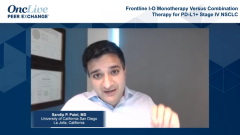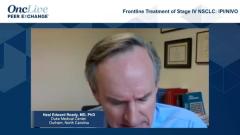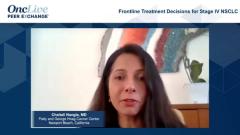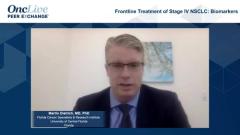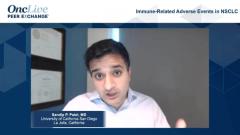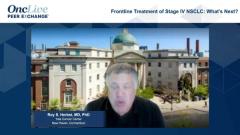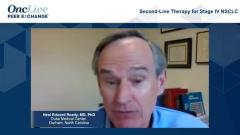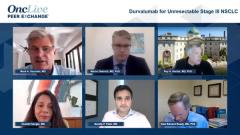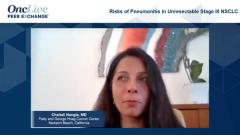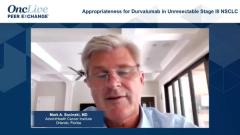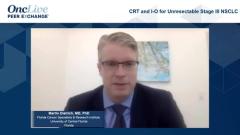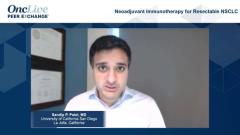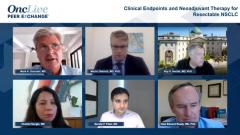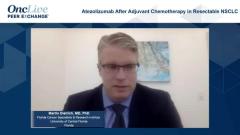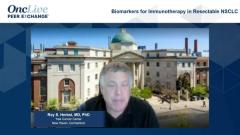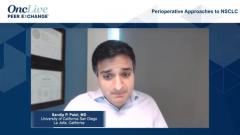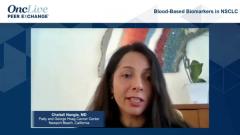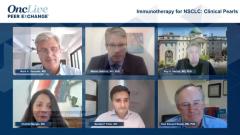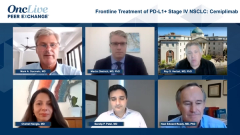
Clinical Endpoints and Neoadjuvant Therapy for Resectable NSCLC
The impact of endpoints used in clinical trials of neoadjuvant therapy for resectable non–small cell lung cancer as they relate to newer drug approvals and real-world practice.
Episodes in this series

Mark A. Socinski, MD: Roy, you’re the king of ADAURA in the disease-free survival [DFS] end point here. We have in CheckMate 816 a pathologic CR [complete response]. We also have major pathologic response rate end points in these sorts of things. Obviously, many of these are co-primary with event-free survival. What are your thoughts in this setting for a true overall survival versus some of these, hopefully, surrogate end points but we don’t quite know that yet?
Roy S. Herbst, MD, PhD: It’s tough. I think DFS is, in my opinion, an approvable and valuable end point. Remember with DFS, we also know patterns of recurrence, that we have recurrence in vital organs, like brain, liver, bone, and we’ve seen, for example, in ADAURA, that those have been decreased. Interestingly, breast cancer targeted therapies have been approved based on DFS for 15-plus years now. I still remember the ASCO [American Society of Clinical Oncology] where that happened with Herceptin [trastuzumab]. That said, I think the results of [CheckMate] 816 are just amazing. Large number of patients as we heard and the difference in pathologic response, extraordinary. But we’re still one step to make this a standard of care. We also don’t know what to do next. Do we continue therapy afterwards? Do we give more chemotherapy? Do we give more immunotherapy? So, I would say, I’d want to see a DFS end point of some sort, at least. And then, if that correlated then in the future, we could start using the pathologic rates if that correlates. But right now, the link has not been made yet. But certainly, the neoadjuvant is here to stay. It’s incredibly exciting. And I can’t help but think that that is going to be the future, but the future still has a little bit of time before it’s ready to take hold.
Mark A. Socinski, MD: Do you favor the neoadjuvant approach versus adjuvant? We have several adjuvant trials ongoing at this point, but thoughts?
Roy S. Herbst, MD, PhD: I think adjuvant is still going to be much more favorite, and then we can do a poll here. But surgery, a very select patients who are getting surgery even for stage IIIA lung cancer these days. So, I think it’s going to be more adjuvant and the adjuvant will be in certainly in a stage IIs that we don’t even know about until surgery. I think adjuvant is going to be a bigger deal than neoadjuvant. Though I think that the neoadjuvant is nice because it’s allowing us to find the right regimens. And we’re getting some science out of it. And they can actually trick a tumor without any operative complications and allow smaller procedures to be done, for example, fewer right pneumonectomies, these are all good things. But I think adjuvant, we saw the first adjuvant trial now at ASCO and I think there’ll be 2, 3, or 4 more behind them in the next year.
Mark A. Socinski, MD: Before we get to that adjuvant trial, I’m going to ask Martin to comment on that in a moment here. But I wanted to get Neal Ready’s perspective on this issue of differences in tumors that may affect resection rates. You’re at an institution with the history of a strong thoracic surgery. We all know the guys and gals at the Duke thoracic surgery department. What are your thoughts on the neoadjuvant and does it raise any issues from your point of view regarding more traditional surgeries followed by adjuvant treatment?
Neal Edward Ready, MD, PhD:I agree with Roy that a lot of treatment will be adjuvant. I think the way it’ll play out is in patients we would’ve given neoadjuvant treatment to anyway—III A disease, multi-stage II, we’ll end up giving chemo IO [immunotherapy], and patients who are good for initial resection without any problems are then we’ll resect them and then get adjuvant IO. And I think that there are…we did a neoadjuvant pembrolizumab [Keytruda] trial, investigator initiated. And similar to these other studies where it’s clear that giving pre-operative IO is safe and feasible. And we published that data. But when Francis talked to Tommy {D'Amico} about it, with IO alone, with pembrolizumab alone, there’s a degree of inflammation and early fibrosis that you don’t see with chemo alone. So, the way Tommy put it was that it’s not as easy as after chemo alone, but it’s not as bad as after chemo radiotherapy alone.
Mark A. Socinski, MD: OK.
Neal Edward Ready, MD, PhD:It’s somewhere between. With IO alone, it probably takes a little bit longer and they end up converting a few of the video assisted surgeries to open. Now, with [CheckMate] 816 it may be different. Maybe when you give 3 cycles of chemoimmunotherapy, you actually shrink the tumor.
Mark A. Socinski, MD: Yeah.
Neal Edward Ready, MD, PhD:The chemo and steroids that may prevent inflammation, so you may actually make it easier. But I think 2 important points when we give preoperative IO is that one, the radiographic responses often underestimate the pathologic responses by a lot. And secondly, when you set up an IO response in the primary tumor, sometimes you see enlargement of regional lymph nodes. That is not cancer progression. That’s inflammation. And interestingly, often it’s like granulomatous disease. So don’t be put off if the preoperative CAT scan doesn’t show a response and don’t be put off if you see enlargement of regional lymph nodes. That’s probably not a true progressive response, progressive…that’s not probably actually progression of cancer. It’s probably just an inflammatory response to the immune system attacking the cancer. I agree, it’s, I think that neoadjuvant chemo IO and IO is going to be as Roy Herbst was saying, an opportunity to get IO into the mix earlier on. When probably there’s less immune evasion in the cancer and the immune system has a better chance to be effective against the cancer.
TRANSCRIPT EDITED FOR CLARITY


